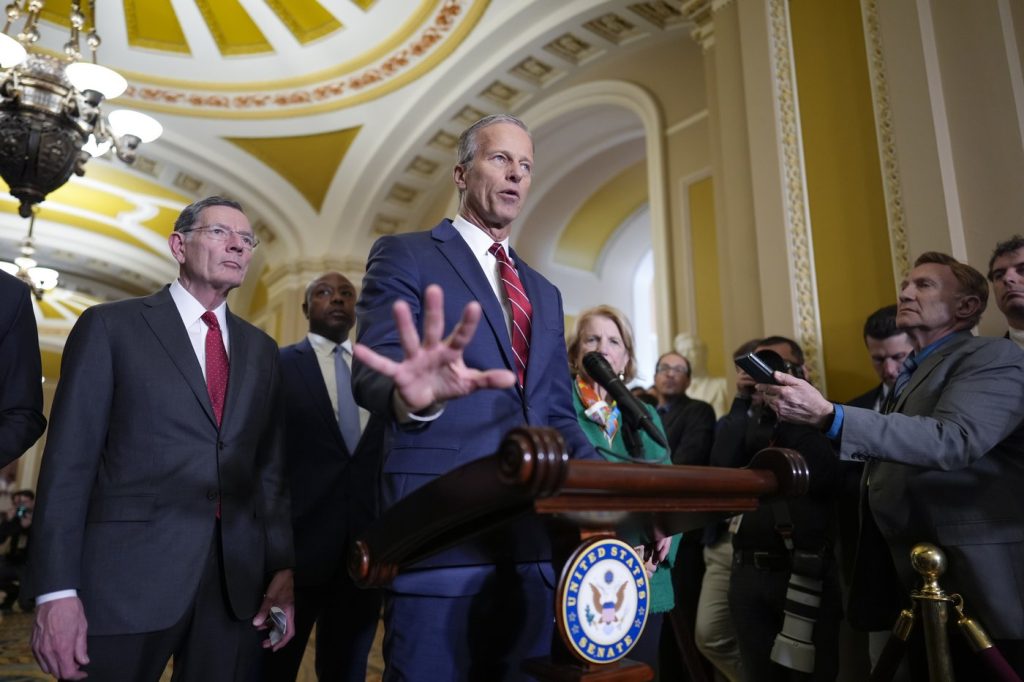WASHINGTON (AP) Senate Republicans are advancing with President Donald Trump's ambitious tax cuts and spending cuts package this week, despite postponing crucial decisions regarding the costs and funding of the multitrillion-dollar legislation. The Senate GOP's budget proposal is aligned with the House Republicans' $4.5 trillion tax cuts initiative, which also aims to eliminate around $2 trillion from healthcare and other programs. By moving forward with this blueprint, Trump’s allies on Capitol Hill are inching closer to a potential compromise that could lead to a final agreement in the coming weeks.
Senate Majority Leader John Thune (R-S.D.) expressed optimism about the progress, stating, "Obviously we are hopeful this week we can get a budget resolution on the floor that will unlock the process. And so we are continuing to move forward with that." Meanwhile, Republicans are under growing political pressure to deliver on what is anticipated to be Trump’s signature domestic policy initiative, which includes extending the tax cuts originally approved in 2017 during his first term. These tax breaks are set to expire at the end of the year, and Trump aims to expand them to cover new areas such as no taxes on tipped wages and overtime pay, fulfilling promises made during the campaign.
On the opposing front, Democrats are gearing up to challenge the GOP’s tax plans, labeling them as benefits for the wealthy, especially while persons like billionaire Elon Musk's Department of Government Efficiency is reportedly implementing significant cuts to federal programs. Democrats argue that these proposed changes risk essential services relied on by millions of Americans. House Democratic leader Hakeem Jeffries emphasized their stance, declaring, "We are standing together against the GOP tax scam and in defense of the American people."
A key contention point between the House and Senate GOP plans is whether the current tax cuts, which are projected to cost the federal government $4.5 trillion in lost revenue over the next decade, should be compensated by other spending reductions. House Republicans are advocating for approximately $2 trillion in cuts to healthcare and various accounts to control federal deficits and mitigate the nation’s increasing debt, which stands at $36 trillion.
However, Senate Republicans have adopted a different stance, arguing that since the tax cuts are already considered a part of current policy, they shouldn’t require new offsetting measures. They propose to adhere to the existing policy framework, suggesting that only Trump's additional tax breaks would incur new costs. This outlook could lead to a compromise that starts with lower spending cut measures, which could be adjusted upward in negotiations with House representatives.
Democratic leaders, including Senate Minority Leader Chuck Schumer, have condemned the Senate GOP’s strategy, labeling it a mere "gimmick" and potentially misleading. Schumer criticized the approach as "an obscene fraud" that American citizens will reject. Democratic Senator Cory Booker emphasized concerns over their proposal's implications for vital federal services and the subsequent inflation of the deficit, suggesting that the GOP is prioritizing substantial tax cuts for the wealthiest.
In congressional discussions, Treasury Secretary Scott Bessent has been involved in talks with GOP leaders, urging rapid progress on Trump's priority legislative package. After a meeting with Senate Republicans, Senator John Cornyn (R-Texas) reiterated the need for swift action. He remarked, "We just got to start voting," indicating a plan for the Senate to begin voting within the week.
Traditionally, proposals based on the current policy baseline must receive approval from the Senate’s nonpartisan parliamentarian to ensure compliance with stringent budgetary rules. Senators from both parties have debated this issue behind closed doors with parliamentarian staff. Nonetheless, GOP leaders maintain that they can advance their current policy baseline without parliamentarian approval, advocating for Senate Budget Chairman Senator Lindsay Graham (R-S.C.) to leverage his position in favor of their approach.
Ultimately, Republican leadership is eager to finalize the framework for the budget resolution this week, which could involve an extended overnight voting session, referred to as a vote-a-rama, for the consideration of various amendments. Following the framework's passage, Republicans anticipate sorting out the intricate details later as they tackle the challenge of building a comprehensive package, even in the face of opposition from Democrats in the weeks or months to come.










